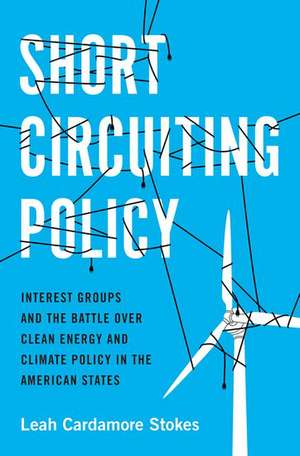Short Circuiting Policy: Interest Groups and the Battle Over Clean Energy and Climate Policy in the American States: Studies in Postwar American Political Development
Autor Leah Cardamore Stokesen Limba Engleză Paperback – 5 iun 2020
| Toate formatele și edițiile | Preț | Express |
|---|---|---|
| Paperback (1) | 174.95 lei 10-16 zile | +74.39 lei 4-10 zile |
| Oxford University Press – 5 iun 2020 | 174.95 lei 10-16 zile | +74.39 lei 4-10 zile |
| Hardback (1) | 588.29 lei 31-37 zile | |
| Oxford University Press – 4 iun 2020 | 588.29 lei 31-37 zile |
Din seria Studies in Postwar American Political Development
- 11%
 Preț: 137.09 lei
Preț: 137.09 lei -
 Preț: 350.43 lei
Preț: 350.43 lei - 18%
 Preț: 173.19 lei
Preț: 173.19 lei -
 Preț: 238.83 lei
Preț: 238.83 lei -
 Preț: 316.91 lei
Preț: 316.91 lei - 5%
 Preț: 248.82 lei
Preț: 248.82 lei -
 Preț: 327.77 lei
Preț: 327.77 lei - 17%
 Preț: 153.62 lei
Preț: 153.62 lei - 19%
 Preț: 199.56 lei
Preț: 199.56 lei - 10%
 Preț: 189.18 lei
Preț: 189.18 lei -
 Preț: 399.19 lei
Preț: 399.19 lei - 8%
 Preț: 183.10 lei
Preț: 183.10 lei - 14%
 Preț: 155.91 lei
Preț: 155.91 lei - 12%
 Preț: 158.06 lei
Preț: 158.06 lei - 12%
 Preț: 136.27 lei
Preț: 136.27 lei - 13%
 Preț: 133.61 lei
Preț: 133.61 lei - 12%
 Preț: 159.47 lei
Preț: 159.47 lei - 24%
 Preț: 376.91 lei
Preț: 376.91 lei - 14%
 Preț: 265.32 lei
Preț: 265.32 lei - 16%
 Preț: 166.36 lei
Preț: 166.36 lei - 27%
 Preț: 384.65 lei
Preț: 384.65 lei - 12%
 Preț: 292.57 lei
Preț: 292.57 lei - 18%
 Preț: 135.64 lei
Preț: 135.64 lei - 27%
 Preț: 359.82 lei
Preț: 359.82 lei - 14%
 Preț: 260.44 lei
Preț: 260.44 lei - 14%
 Preț: 270.71 lei
Preț: 270.71 lei -
 Preț: 220.04 lei
Preț: 220.04 lei - 27%
 Preț: 322.06 lei
Preț: 322.06 lei - 9%
 Preț: 478.92 lei
Preț: 478.92 lei -
 Preț: 302.59 lei
Preț: 302.59 lei
Preț: 174.95 lei
Preț vechi: 231.05 lei
-24% Nou
Puncte Express: 262
Preț estimativ în valută:
33.48€ • 36.36$ • 28.12£
33.48€ • 36.36$ • 28.12£
Carte disponibilă
Livrare economică 21-27 martie
Livrare express 15-21 martie pentru 84.38 lei
Preluare comenzi: 021 569.72.76
Specificații
ISBN-13: 9780190074265
ISBN-10: 0190074264
Pagini: 336
Ilustrații: 21 black and white line drawings
Dimensiuni: 155 x 231 x 23 mm
Greutate: 0.48 kg
Editura: Oxford University Press
Colecția OUP USA
Seria Studies in Postwar American Political Development
Locul publicării:New York, United States
ISBN-10: 0190074264
Pagini: 336
Ilustrații: 21 black and white line drawings
Dimensiuni: 155 x 231 x 23 mm
Greutate: 0.48 kg
Editura: Oxford University Press
Colecția OUP USA
Seria Studies in Postwar American Political Development
Locul publicării:New York, United States
Recenzii
Stokes has written a highly readable and compelling book that will be of interest to environmental policy scholars and the general public alike
This is a book of the very first importance, a stunningly good piece of investigation that lays bare the answer to what may be the world's most important mystery: why are we moving so slowly to address the greatest crisis the planet has ever faced? It should be read-and memorized-by everyone who deals with energy policy in any way, shape, or form.
With Washington gridlocked or worse, advocates for action on climate change have looked to the states for leadership. In this deeply researched and sobering analysis, Leah Stokes shows why these hopes must be combined with vigilance and tenacity. Even where states have managed to introduce innovative reforms, Stokes shows, deeply entrenched and resourceful fossil fuel interests can often regain the upper hand.
With US national politics deadlocked under right-wing dominance, crucial battles over clean energy are playing out in the states. In this brilliant new book, Leah Stokes spells out exactly how and why entrenched interests can take advantage of weak, ambiguous laws to achieve costly delays and hobble infant clean energy sources. All citizens fighting for effective responses to global warming should heed the lessons in this book-and scholars studying policy battles in many other realms have much to learn from it as well.
This is a book of the very first importance, a stunningly good piece of investigation that lays bare the answer to what may be the world's most important mystery: why are we moving so slowly to address the greatest crisis the planet has ever faced? It should be read-and memorized-by everyone who deals with energy policy in any way, shape, or form.
With Washington gridlocked or worse, advocates for action on climate change have looked to the states for leadership. In this deeply researched and sobering analysis, Leah Stokes shows why these hopes must be combined with vigilance and tenacity. Even where states have managed to introduce innovative reforms, Stokes shows, deeply entrenched and resourceful fossil fuel interests can often regain the upper hand.
With US national politics deadlocked under right-wing dominance, crucial battles over clean energy are playing out in the states. In this brilliant new book, Leah Stokes spells out exactly how and why entrenched interests can take advantage of weak, ambiguous laws to achieve costly delays and hobble infant clean energy sources. All citizens fighting for effective responses to global warming should heed the lessons in this book-and scholars studying policy battles in many other realms have much to learn from it as well.
Notă biografică
Leah Cardamore Stokes is Assistant Professor of Political Science at the University of California Santa Barbara. Her research and writing on climate change and energy policy has appeared in The New York Times, The Washington Post, The Los Angeles Times, The Guardian, as well as numerous scholarly journals.
